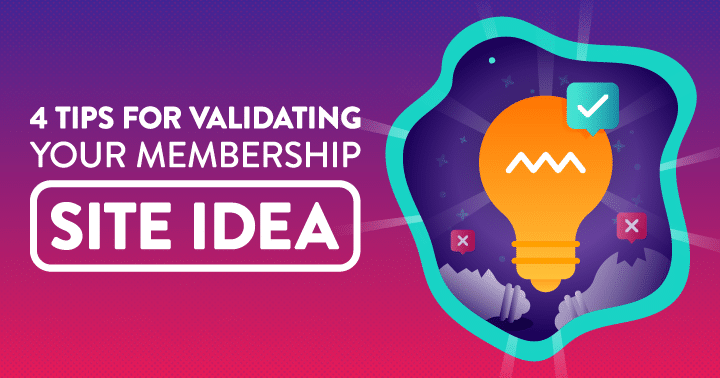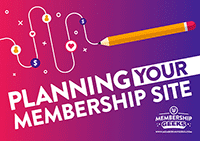When inspiration strikes and you come up with a big idea—like a membership site or another product—it’s easy to get swept up in the excitement.
You may feel confident it’s a winner and jump straight into making it a reality. But before you invest hours of hard work, it’s essential to validate your membership site idea.
Validating your idea ensures there’s real demand for it and saves you time, money, and frustration.
Here are my top tips for doing just that…
Don't rely on the opinions of your friends and family
I've lost count how many people have approached me with absolutely terrible ideas that they've been convinced are utter genius by their friends and family.
Many people run their ideas past friends and family first. While it makes sense, this often leads to misleading feedback.
Why? Your loved ones want to support you. Even the most honest friend may soften their feedback to avoid hurting your feelings. They might not even fully understand your idea but pretend they do to avoid appearing confused.
Most importantly, your friends and family likely aren’t your target audience. Nor will they have any real understanding or appreciation of the market you're going to be targeting. They don’t know the market, what works, or what competitors already offer.
I'm not telling you not to run things past your family and friends at all, just to maintain perspective on the credibility of their input in terms of helping you to validate your idea.
Too often, people head in the wrong direction because their friends and family told them their idea was amazing. While loved ones mean well and want to be supportive, their positivity can create a false sense of confidence.
Look at what's already out there
One of the best ways to validate your membership site idea is to look at what’s already out there. If competitors are already offering something similar, take it as a good sign. It proves there’s demand for your concept.
Some people shy away from competition, but it’s actually a green flag. The flip side is coming up with an idea that has no competition. Often, this means the market—and demand—doesn’t exist.
Here’s how to do market research effectively:
- Look for existing courses, books, blogs, or podcasts in your niche.
- Check what topics generate engagement and interest.
- Read blog comments, social media threads, or book reviews for feedback. Look for gaps or areas where people feel content is lacking.
By understanding the market, you’ll discover opportunities to offer a fresh perspective. You can adapt your idea to stand out and deliver what your audience needs.
Start collecting leads early
Before fully committing to building your membership site, it’s a good idea to test the waters by collecting leads. Lead generation – namely getting people to subscribe to your email list – is a great way to validate interest while also building an audience for your future launch.
The actual specifics aren't important yet – it doesn't matter at this stage whether you're thinking of a full blown membership site, ebook or video course; if your basic idea sucks, the “delivery method” won't make a difference.
Start by creating a simple landing page using tools like Leadpages or Unbounce. On the page, offer something valuable in exchange for email addresses, like a free ebook, checklist, or short video. Alternatively, you can use a “coming soon” approach by outlining your idea and inviting people to register their interest for updates. Once the landing page is set up, connect it to an email marketing platform like ActiveCampaign to manage sign-ups and follow-ups seamlessly.
Then it's simply a case of pushing traffic to your landing page – either organically by promoting it on social media or to an existing email list – or by using pay-per-click (PPC) advertising.
If people are willing to provide their email addresses, it’s a strong sign there’s real demand for what you’re offering. Not only does this validate your idea, but you’ll also have a growing email list of potential customers ready to hear more when your membership site launches.
Test the market with a ‘minimum viable product'
Once you’ve confirmed there’s interest, take it a step further by testing the market with a minimum viable product.
A “minimum viable product” – or “MVP” to use the ever-so trendy lingo – is an offering in the same vein as your intended final product, targeting the same audience, but done in such a way that doesn't require as much upfront work, time and financial investment to get going.
Note that this doesn't mean a “rushed” version of your final product – more something that will achieve the same objectives for your customer as you hope to achieve with your final product, but in a manner that doesn't require too much input to “go to market”.
So, for example:
- Developing a course teaching people how to play the trumpet? Start with 1-to-1 coaching sessions over Zoom to test demand.
-
Building a paid coaching community online? Do a trial run with an MVP consisting of a series of group coaching calls supplemented by a private Facebook group.
- Creating software lessons? You could first try an MVP of a brief ebook that focuses on one specific area of that software.
The goal is simple: test whether people will pay for what you’re offering before you commit to building the full version. If your MVP resonates with customers, you’ll know you’re on the right track.
Testing the market with a minimum viable product is a great way to establish that the demand for what you're offering exists, and to save you a lot of time, effort and disappointment in the long run.
In conclusion: Validate before you build
Taking the time to validate your membership site idea is a critical step toward success. By avoiding common pitfalls—like relying solely on friends and family—and conducting proper market research, you’ll build a stronger foundation.
Use tools like lead generation and minimum viable products to test interest and refine your idea. It’s better to confirm demand upfront than to invest time and effort into a project no one wants.
Want to take the guesswork out of launching your membership site? Join Membership Academy for expert guidance, proven strategies, and access to the tools and community you need to succeed.





